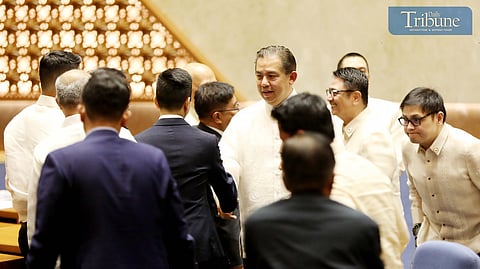
- NEWS
- the EDIT
- COMMENTARY
- BUSINESS
- LIFE
- SHOW
- ACTION
- GLOBAL GOALS
- SNAPS
- DYARYO TIRADA
- MORE

Reelected Leyte 1st District Representative Ferdinand Martin Romualdez said the 20th Congress must focus its legislative agenda on economic measures that will help the Philippines attain upper-middle income country (UMIC) status by 2025 or 2026.
Romualdez, who served as Speaker in the 19th Congress, echoed Finance Secretary Ralph Recto’s optimism that the country could meet the World Bank’s UMIC threshold — currently set at a gross national income (GNI) per capita of USD 4,496—within the next two years.
Based on the World Bank’s latest classification as of 2024, the Philippines' GNI per capita stands at USD 4,470.
“Achieving upper-middle income status is a meaningful milestone, but more important is ensuring that growth leads to tangible improvements in the lives of our people,” Romualdez said in a statement on Saturday.
He emphasized that the 20th Congress, set to open later this month, must prioritize legislation that boosts investments in infrastructure, digitalization, and human capital while improving public services and strengthening food security, healthcare, and education.
These efforts, he said, are aligned with the Marcos administration’s vision for a “Bagong Pilipinas.”
The Marcos administration, in its 2024 Philippine Development Report, projected that the Philippines could achieve upper middle-income status by 2025 or 2026, citing strong economic performance and prudent fiscal management as key drivers.
Romualdez also underscored the importance of aligning the 2026 national budget — proposed at P6.793 trillion — with these development goals.
He said close coordination with the Department of Budget and Management (DBM) is crucial to ensure that spending promotes poverty reduction, addresses inequality, and improves access to government services.
This, he added, also ensures that the proposed P6.793 trillion national budget for 2026 becomes a strategic instrument in advancing the administration’s medium-term development goals.
“I will espouse legislative priorities that would help sustain this momentum,” Romualdez said.
“Our goal is to create a policy environment that supports job creation, raises incomes, and ensures that economic gains are felt across all sectors of society,” he added.
Romualdez then assured that the House, under his leadership and in partnership with the executive, would support the administration’s fiscal roadmap while remaining mindful of inflation risks and long-term sustainability.
“Sound budgeting and responsible legislation go hand in hand. The House is committed to supporting the executive’s fiscal roadmap and ensuring that resources are directed toward inclusive and sustainable development,” he said.
Romualdez likewise expressed confidence that the House would continue working with the administration to pass measures supporting these objectives, while being mindful of inflation risks and fiscal sustainability.
“We are committed to legislation that enables broad-based progress and economic security for all Filipinos,” he said.
